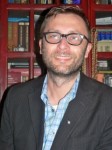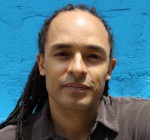MID-CAREER FACULTY FELLOWS
The Odious Demon from Across the Sea: Oliver Cromwell and Religious Memorialization in Ireland (1650-1900)
Sarah Covington is professor of history at Queens College, specializing in early modern Britain and Ireland. Her first book, The Trail of Martyrdom: Persecution and Resistance in Sixteenth-Century England (Notre Dame, 2003), explored the process by which individuals were tried and executed for religion in Tudor England, while her second book, Wounds, Flesh and Metaphor in Seventeenth-Century England (Palgrave-Macmillan, 2009) examined the use of metaphor across literary, legal, political, military, and philosophical discourses as a response to the turbulence of civil war. Currently she is writing a book the afterlife of Oliver Cromwell and his invasion of Ireland over the course of three centuries and across folkloric, literary, and historical culture; she is also the author of nineteen articles devoted to themes of violence, trauma, religion, and memory, and is in the process of another book project consisting of essays, some already published, devoted to the early modern interpretation of problematic biblical episodes or characters (Cain, Job, Gethsemane, Judas). The recipient of fellowships from the NEH, the University of Aberdeen, and, with the Ahmanson-Getty, UCLA, she is also currently the book reviews editor of the Renaissance Quarterly, a leading interdisciplinary journal of the early modern period.
 mdekel@ccny.edu
mdekel@ccny.edu
A Voice from Home is Calling my Name: On the Possibility of Productive Guilt
Mikhal Dekel received her Ph.D. in Comparative Literature from Columbia University in 2005 and currently teaches in the English Department and the Comparative Literature Program at CCNY. Her book, The Universal Jew: Masculinity, Modernity and the Zionist Moment was published in 2011 by Northwestern University Press. Her articles, translations and blogs have appeared in ELH, WSQ, Callaloo, Guernica, Shofar, Jewish Social Studies and in various anthologies, the latest of which is The Global and the Intimate (Columbia University Press, 2012). She has received grants from the Mellon Foundation, National Foundation for Jewish Culture and the PSC-CUNY. She is currently working on a comparative study of representations of guilt in post-conflict societies.
After Sefarad: Expulsion, Conversion and Secrecy in Contemporary Literature and Culture
Dalia Kandiyoti (Ph.D. Comparative Literature) is Associate Professor of English at the College of Staten Island-CUNY. Her areas of research include diaspora studies of the Americas and Sephardism in world literature. Her book, Migrant Sites: America, Place, and Diaspora Literatures, was published by Dartmouth College/University Press of New England. She has received awards from PSC-CUNY, the Mellon Foundation, and NEH and published in journals and edited volumes articles on Latina literature, Sephardic writing, diaspora and place, and U.S. and Argentine literatures of migration. Her project for the seminar is to examine narratives of conversion and expulsion in the contemporary global novel.
Oil Depletion, Divine Knowledge, and the Imaginations of the Future in Southern Arabia
Mandana E. Limbert received her PhD in Anthropology and Near Eastern Studies from the University of Michigan in 2002 and joined the Queens College (CUNY) faculty the same year. She became a member of the faculty of the CUNY Graduate Center in 2007. She has also been a fellow and visiting scholar at The University of Michigan’s Institute for Research on Women and Gender (1999-2000), New York University’s Center for Near Eastern Studies (2000-2001), the University of California, Berkeley’s Center for Middle Eastern Studies (2001-2002), and Duke University’s Department of Cultural Anthropology (2008-2010). She joined the History department at North Carolina State University (2009-2010).
In addition to numerous articles, Professor Limbert has co-edited “Timely Assets: The Politics of Resources and their Temporalities” (2008), published by the School of American Research, Advanced Seminar Series. Her book, “In the Time of Oil: Piety, Memory, and Social Life in an Omani Town” was published by Stanford University Press (2010). And, with support from the American Council of Learned Societies, Professor Limbert began writing her next book, “Oman, Zanzibar, and the Politics of Becoming Arab” on changing notions of Arabness in Oman and Zanzibar over the course of the twentieth century. Her project this year examines changing understandings and experiences of projections about oil depletion in light of theological and political debates about Oman’s future.
 robert.maryks@bcc.cuny.edu
robert.maryks@bcc.cuny.edu
The Suppression of the Jesuit Order in the Portuguese Empire as an Aftershock of the 1755 Lisbon Earthquake
Robert A. Maryks, received his doctorate in History at Fordham University in 2006. Maryks is Associate Professor of History at Bronx CC of the City University of New York. He has published extensively on the history of Jesuits, including Saint Cicero and the Jesuits: The Influence of the Liberal Arts on the Adoption of Moral Probabilism (Ashgate, 2008); The Jesuit Order as a Synagogue of Jews: Jesuits of Jewish Ancestry and Purity-of-Blood Laws in the Early Society of Jesus (Brill, 2009), and Pouring Jewish Water into Fascist Wine. Untold Stories of (Catholic) Jews from the Archive of Mussolini’s Jesuit Pietro Tacchi Venturi (Brill, 2011). He is Editor-in-chief of the newly founded Journal of Jesuit Interdisciplinary Studies (JJIS). Dr. Maryks is currently working on a sequel to his Pouring Jewish Water into Fascist Wine.
 profobi@gmail.com
profobi@gmail.com
Los Ayudados: Ensuring Community Survival Through Afro-Columbian Religion
T.J. Desch-Obi is an Associate Professor of History at Baruch College, where he also teaches in the Religion and the Latin American and Caribbean Studies programs. His research focuses on the history of African and African Diaspora martial arts, spirituality, and historical ethnography. He is the author of Fighting For Honor: The History of African Martial Art Traditions in the Atlantic World (University of South Carolina Press, 2008). His currently projects focus on a trans-national history of black boxing styles, and Afro-Colombian martial arts and religion as modes of social resistance.
Postdoctoral Fellow
Lydia Wilson is currently researching emerging political narratives, ideological uses of history, and sacred values and moral decision making in post-Mubarak Egypt. Her PhD (History and Philosophy of Science, University of Cambridge, UK) was in medieval Arabic philosophy, translating and exploring The Enumeration of the Sciences written in the mid-10th century by the philosopher al-Fārābī. Between the PhD and CUNY, there was a postdoc in the Department of History and Philosophy of Science, Cambridge, researching material culture of 20th and 21st century science, and policies for its preservation. Lydia is a fellow at ARTIS Center for Conflict Resolution, a research affiliate in History and Philosophy of Science, University of Cambridge, and the editor of the Cambridge Literary Review. She reviews regularly for the Times Literary Supplement.
Dissertation Fellows
The Political Ethics of Intimacy in American Evangelism
Sophie Statzel Bjork-James is a doctoral candidate in Anthropology at the City University of New York. She received a Masters in Education from the Ontario Institute for Studies in Education and a BA from Fairhaven College. Her dissertation, The Political Ethics of Intimacy in American Evangelicalism, investigates the role of the family in shaping what she calls “lived evangelicalism” and how religious ethics shape political persuasions and behavior. Her dissertation takes on one of the most contentious questions in contemporary American religion: what role should religion play in the public sphere? By showing the relationship between lived religious ethics and political persuasions, this dissertation seeks to elucidate why the separation of religion and politics is so difficult to do in practice, and why different histories and geographies produce such distinct types of political engagements. Her research interests include nationalist movements, religious mobilizations, and critical race theory.

akoenig@gc.cuny.edu
Near to God: Apocalyptic Thought and the American Right
Alan Koenig holds a double BA in Politics and Modern Literature (honors) from the University of California, Santa Cruz and a MA in political science from the New School for Social Research. His master’s thesis provided a comparative examination of the intertwined evolutions of organized crime and post-Soviet state reformation in Russia, the Yakuza and right-wing parties in post-WW II Japan, and triads and the Kuomintang in China during the 20s and 30s. He is working on a political theory dissertation exploring apocalypticism in American conservative thought, focusing on the exemplary works of the Mormon prophet Joseph Smith, Herman Kahn, and Ayn Rand. He has written for The Believer, 3QuarksDaily, Radical Society, the GC Advocate and served as a co-editor for OldTownReview.


